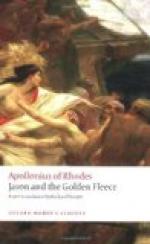“O my friends, not all men are arrogant, it seems, nor unmindful of benefits. Even as this man, loyal as he is, came hither to learn his fate. For when he laboured the most and toiled the most, then the needs of life, ever growing more and more, would waste him, and day after day ever dawned more wretched, nor was there any respite to his toil. But he was paying the sad penalty of his father’s sin. For he when alone on the mountains, felling trees, once slighted the prayers of a Hamadryad, who wept and sought to soften him with plaintive words, not to cut down the stump of an oak tree coeval with herself, wherein for a long time she had lived continually; but he in the arrogance of youth recklessly cut it down. So to him the nymph thereafter made her death a curse, to him and to his children. I indeed knew of the sin when he came; and I bid him build an altar to the Thynian nymph, and offer on it an atoning sacrifice, with prayer to escape his father’s fate. Here, ever since he escaped the god-sent doom, never has he forgotten or neglected me; but sorely and against his will do I send him from my doors, so eager is he to remain with me in my affliction.”
Thus spake Agenor’s son; and his friend straightway came near leading two sheep from the flock. And up rose Jason and up rose the sons of Boreas at the bidding of the aged sire. And quickly they called upon Apollo, lord of prophecy, and offered sacrifice upon the hearth as the day was just sinking. And the younger comrades made ready a feast to their hearts’ desire. Thereupon having well feasted they turned themselves to rest, some near the ship’s hawsers, others in groups throughout the mansion. And at dawn the Etesian winds blew strongly, which by the command of Zeus blow over every land equally.
Cyrene, the tale goes, once tended sheep along the marsh-meadow of Peneus among men of old time; for dear to her were maidenhood and a couch unstained. But, as she guarded her flock by the river, Apollo carried her off far from Haemonia and placed her among the nymphs of the land, who dwelt in Libya near the Myrtosian height. And here to Phoebus she bore Aristaeus whom the Haemonians, rich in corn-land, call “Hunter” and “Shepherd.” Her, of his love, the god made a nymph there, of long life and a huntress, and his son he brought while still an infant to be nurtured in the cave of Cheiron. And to him when he grew to manhood the Muses gave a bride, and taught him the arts of healing and of prophecy; and they made him the keeper of their sheep, of all that grazed on the Athamantian plain of Phthia and round steep Othrys and the sacred stream of the river Apidanus. But when from heaven Sirius scorched the Minoan Isles, and for long there was no respite for the inhabitants, then by the injunction of the Far-Darter they summoned Aristaeus to ward off the pestilence. And by his father’s command he left Phthia and made his home in Ceos, and gathered together the Parrhasian people who are of the lineage of Lycaon, and he built a great altar to Zeus Icmaeus, and duly offered sacrifices upon the mountains to that star Sirius, and to Zeus son of Cronos himself. And on this account it is that Etesian winds from Zeus cool the land for forty days, and in Ceos even now the priests offer sacrifices before the rising of the Dog-star.




